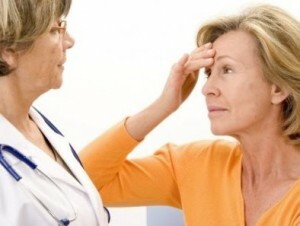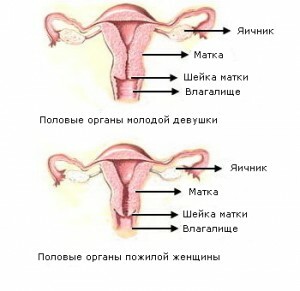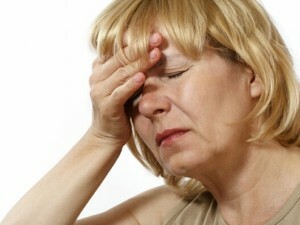Time flies quickly, and yesterday's high school student, the bride, the mother of an adult daughter, discovers that her body begins to work differently than she used to in the last 30-35 years. The second transitional age of a woman lasts 1-2 years. And when postmenopause comes, what it is like to live in this period, it becomes very important.
Why it is impossible to be eternally young?
 All living things develop in such a way that when they are born, they gradually gain strength, then they are in the blossoming period, then gradually fades. Not an exception and a female body that passes several levels. Postmenopause is one of them that is final.
All living things develop in such a way that when they are born, they gradually gain strength, then they are in the blossoming period, then gradually fades. Not an exception and a female body that passes several levels. Postmenopause is one of them that is final.
This state is counted from the last monthly period. If there is no year, all this time and subsequent periods are postmenopausal. She is absolutely natural at a certain age.
The causes of postmenopause are laid in the natural development of the female reproductive system. It functions due to hormones produced by the pituitary gland, adrenals, and ovaries. Over time, these bodies exhaust their resources, the production of the necessary substances is reduced.
This applies most to the ovaries. In them, the stock of sex cells ends, estradiol ceases to be produced, as a result of which the concentration of FSH and LH increases. Progesterone also falls. All this makes it impossible to update the uterine mucosa. First, menstruation becomes more rare, then cease altogether.
Postmenopausal manifestations
Postmenopause is identified with the climax, attributing to it all its manifestations. In some, this is fully justified, since the feelings carried by the woman are equally strong for several months and longer.
But most of the signs of postmenopause are weakened symptoms of menopause plus some more features:
- Body weight increases. This is due to the increase in fat cells, and the diet and lifestyle does not change. Many say that they do not get fat from cutlets, but from years, and they are right. Excess weight - compensation for reducing estrogen levels. This is a natural process, but the body seeks to fill their stock. In addition to the ovaries that have stopped functioning, estrogen is capable of fatty tissue;
- It becomes more difficult to retain urine, but the possibility of cystitis or urethritis increases. These postmenopausal symptoms in women are also provoked by loss of estrogen. Hormones were kept in the tone of the bladder wall, so that the fluid was not withdrawn involuntarily. Now they are weakened so much that a minimal physical effort can cause urination. This is also facilitated by the loss of tissue elasticity;
- Mucous membranes of the genital organs become drier, and the organs themselves lose their former tone. Hormonal changes lead to impaired production of collagen, and hence cervical and vaginal secretions. Because of this, discomfort in the vagina is felt, its walls may fall;
- Insomnia and too emotional reactions characteristic of the onset of the climacteric period persist. Postmenopause symptoms of this discharge makes it less pronounced. But the tides, irritability, resentment do not go away definitively;
- Bone tissue loses its former strength due to calcium deficiency and difficulties with its assimilation. The awkward movement or fall, which would have ended with a bruise, can now lead to a fracture.
What should be the selection?

Changes in the genitals of women with postmenopause
Follow the discharge with a long absence of menstruation is necessary. After menopause, the work of the cervix changes, it no longer produces so much mucus. The new composition of hormones affects the microflora of the vagina. Sex organs become defenseless before infections.
If from the genital tracts colored, smelling badly, making itchy mucus masses, this is a sign of one of the diseases. The risk of negative development of the endometrium is also increasing. On the mucosa can form polyps, there is hyperplasia.
It is important to regularly monitor discharge in postmenopause, the norm meets the following criteria:
- Mucous, clear;
- In small quantities;
- Consistency is similar to a decoction of rice;
- Do not smell, do not deliver unpleasant sensations.
Time for extinction of the reproductive function
Changes in the reproductive system do not occur immediately, may not always be understandable. Similar manifestations are due to stress, disease. Therefore, not everyone can immediately determine when the postmenopause occurs.
This term physicians refer to a period of 12 months after the end of the last menstrual period and longer. The normal onset of postmenopause is from 45 years and up to 55. Rarely, but there is an earlier arrival. It happens because of hereditary features or hormonal disorders. Diseases also force doctors to resort to the artificial creation of conditions for the complete cessation of menstruation.
Premenopause and menopause precedes everything, that is, other transitional periods of women, postmenopause, whose age of onset is 51 years on average, the latter in this series.
How to understand that there was a postmenopause?
Female reproductive system is complicated. Even her owner, knowing her own characteristics and coming to the appropriate milieu, can not always understand what is happening. Especially, the age interval in which the functions of the ovaries are completely extinguished is quite large.
For these reasons, it is necessary to diagnose postmenopause, which will be able to differentiate natural processes in the reproductive organs from pathological ones. And the signs of the condition are such that you will have to assess the risks of getting sick, look for ways to prevent it. If a woman has no year for men, she should do:
-
 FSH assay( it will be increased);
FSH assay( it will be increased); - Estradiol assay( its value will be minimal);
- Assay for male hormones( their number will increase);
- of a small pelvic ultrasound( it will reveal the absence of follicles and changes in the endometrium).
These methods are sufficiently informative to establish that the postmenopausal period has indeed occurred. But to estimate the damage inflicted by her body with the help of:
- General blood test;
- ultrasound of the abdominal cavity;
- Hysteroscopy;
- Mammography;
- Cytological examination of the mucous neck;
- Osteodensitometry, which studies the density of bone tissue.
Life after youth
Life after menopause in women does not end. On the contrary, it acquires advantages: one should not be afraid of unwanted pregnancy, you can pay more attention to yourself with a clear conscience. But it is absolutely necessary to adhere to certain life rules:
- In food. Heavy protein and fatty foods not only do not need the body, but also harm. It increases cholesterol, increases blood pressure and weight. It is necessary to eat more fruits, vegetables, sprouted cereals, nuts. Sour-milk products are obligatory in the diet, they are the best friends of bones and enemies of osteoporosis;
- In physical exertion. Correction of postmenopause does not require a complete cessation of all activity because of the increased risk of fractures. On the contrary, a reasonable physical load is necessary. Strengthening of muscles retains and bone tissue, contributes to the normalization of metabolic processes, stalled because of hormonal deficiency. Hiking, swimming, some exercises from yoga will help to keep the tone and well-being;
- In sex. Making love with pleasure will save you from negative emotions, prolong your youth. And to eliminate the dryness of the vagina there are special means.

Medications for alleviating the symptoms of
There are many tools for alleviating postmenopausal symptoms. They should be prescribed by a doctor, taking into account all the nuances of the organism of a particular woman. Independent choice may be incorrect, leading to aggravation of negative symptoms, bleeding, the emergence of tumors and the development of existing ailments.
Most experts are sure, once the decrease in the number of active substances is the main cause of such a condition as postmenopause, treatment, drugs must make up for their deficiency. And patients, on the contrary, consider it undesirable to "sit down on hormones".Of course, substitution therapy has contraindications:
- Tumor diseases of mammary glands and mucous uterus;
- Systemic autoimmune diseases;
- Serious problems with the liver and biliary tract.
But this is the most effective treatment. In the absence of the listed problems, the estrogen deficiency will be filled:
-
 Dermestrel;
Dermestrel; - Divina;
- Ovestin;
- Divissek;
- of the Climara;
- Proginova;
- Climen.
For the introduction into the body of a complex of sex hormones, a specialist can appoint:
- Livial;
- Femoston;
- Triekwens;
- Climonorum.
If it is not possible to use hormonal drugs in a condition such as postmenopause, the recommendations of the doctors contain phytopreparations improving the well-being:
- Estroel;
- Climadinone;
- Feminal;
- Qi-Klim;
- Climatoplan;
- Remance.
Despite the natural origin of the listed drugs, they are not shown to everyone. If a woman has an estrogen-dependent tumor, they can not be used.
 We recommend reading the article about the symptoms of menopause in women. You will learn what it is, about the tides and changes in emotions during this period, the peculiarities of the reproductive system and medication.
We recommend reading the article about the symptoms of menopause in women. You will learn what it is, about the tides and changes in emotions during this period, the peculiarities of the reproductive system and medication.
Additional measures in therapy
Forget about a condition such as postmenopause, and what it is with respect to the nervous system will help soothing:
- Atarax;
- Grandaxin;
- Gelar;
- Cleophyte.
Increase bone density:
- Calcemin;
- Bonviva;
- Aquadetry;
- Osteogenon.

Useful folk recipes can be:
- Infusion of St. John's wort, which reduces emotional manifestations, normalizes blood supply, relieves hot flashes;
- Ginseng broth. Eliminates stress, reduces fatigue;
- Licorice infusion. Stimulates its own estrogenic activity, strengthens bones;
- Sage broth. Reduces sweating, gives a strong sleep, restores heart rhythm.
Herbal medicines should also be taken after consultation with a doctor.
Postmenopause does not pass by anyone that this is learned by every woman in her time. I want this period not to be filled with disease, but just another life stage. Making it safe is possible if you are more active in health, consulting with specialists.
